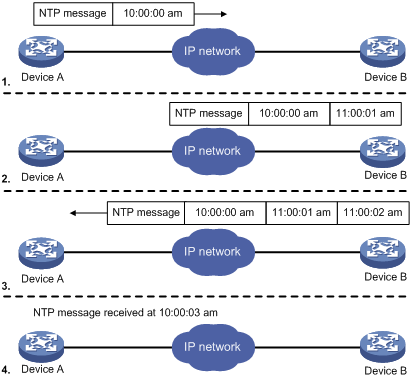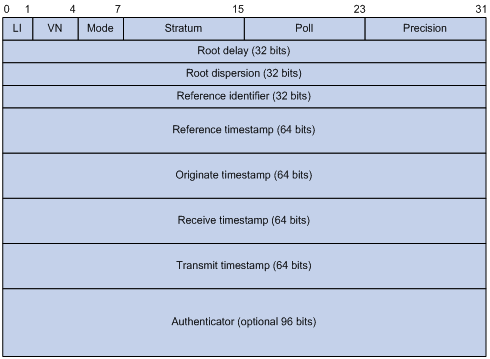通过NTP协议进行时间同步
NTP(Network Time Protocol,网络时间协议)是由RFC 1305定义的时间同步协议,用来在分布式时间服务器和客户端之间进行时间同步。
NTP工作原理
NTP的基本工作原理如下图所示。Device A和Device B通过网络相连,它们都有自己独立的系统时钟,需要通过NTP实现各自系统时钟的自动同步。为便于理解,作如下假设:
- 在Device A和Device B的系统时钟同步之前,Device A的时钟设定为10:00:00am,Device B的时钟设定为11:00:00am。
- Device B作为NTP时间服务器,即Device A将使自己的时钟与Device B的时钟同步。
- NTP报文在Device A和Device B之间单向传输所需要的时间为1秒。
- Device A发送一个NTP报文给Device B,该报文带有它离开Device A时的时间戳,该时间戳为10:00:00am(T1)。
- 当此NTP报文到达Device B时,Device B加上自己的时间戳,该时间戳为11:00:01am(T2)。
- 当此NTP报文离开Device B时,Device B再加上自己的时间戳,该时间戳为11:00:02am(T3)。
- 当Device A接收到该响应报文时,Device A的本地时间为10:00:03am(T4)。
至此,Device A已经拥有足够的信息来计算两个重要的参数:
- NTP报文的往返时延Delay=(T4-T1)-(T3-T2)=2秒。
- Device A相对Device B的时间差offset=((T2-T1)+(T3-T4))/2=1小时。
NTP的报文格式
NTP有两种不同类型的报文,一种是时钟同步报文,另一种是控制报文(仅用于需要网络管理的场合,与本文无关,这里不做介绍)。
NTP基于UDP报文进行传输,使用的UDP端口号为123;时钟同步报文封装在UDP报文中,其格式如下图所示。
主要字段的解释如下:
- LI(Leap Indicator):长度为2比特,值为“11”时表示告警状态,时钟未被同步。为其他值时NTP本身不做处理。
- VN(Version Number):长度为3比特,表示NTP的版本号,目前的最新版本为3。
- Mode:长度为3比特,表示NTP的工作模式。不同的值所表示的含义分别是:0未定义、1表示主动对等体模式、2表示被动对等体模式、3表示客户模式、4表示服务器模式、5表示广播模式或组播模式、6表示此报文为NTP控制报文、7预留给内部使用。
- Stratum:系统时钟的层数,取值范围为1~16,它定义了时钟的准确度。层数为1的时钟准确度最高,准确度从1到16依次递减,层数为16的时钟处于未同步状态,不能作为参考时钟。
- Poll:轮询时间,即两个连续NTP报文之间的时间间隔。
- Precision:系统时钟的精度。
- Root Delay:本地到主参考时钟源的往返时间。
- Root Dispersion:系统时钟相对于主参考时钟的最大误差。
- Reference Identifier:参考时钟源的标识。
- Reference Timestamp:系统时钟最后一次被设定或更新的时间。
- Originate Timestamp:NTP请求报文离开发送端时发送端的本地时间。
- Receive Timestamp:NTP请求报文到达接收端时接收端的本地时间。
- Transmit Timestamp:应答报文离开应答者时应答者的本地时间。
- Authenticator:验证信息。
NTP时间同步的实现
有了上述基础知识后,我们就可以实现自己的时间同步工具了,下文附了一个简单的C#的实现。
class NptClient
{
IPAddress ntpServer;
public NptClient(IPAddress ntpServer)
{
this.ntpServer = ntpServer;
}
public DateTime GetServerTime()
{
var startTime = DateTime.Now;
var ntpTime = NTPData.Test(ntpServer);
var recvTime = DateTime.Now;
var offset = ((ntpTime.ReceiveTimestamp - startTime) + (ntpTime.TransmitTimestamp - recvTime));
offset = offset.Subtract(TimeSpan.FromSeconds(offset.TotalSeconds / 2));
return recvTime + offset;
}
}
[StructLayout(LayoutKind.Sequential)]
class NTPData
{
byte header = 0;
byte Stratum = 1; //系统时钟的层数,取值范围为1~16,它定义了时钟的准确度
byte Poll = 1; //轮询时间,即两个连续NTP报文之间的时间间隔
byte Precision = 1; //系统时钟的精度
BigEndianUInt32 rootDelay;
BigEndianUInt32 referenceIdentifier;
BigEndianUInt32 ReferenceIdentifier;
public NtpTime ReferenceTimestamp { get; private set; }
public NtpTime OriginateTimestamp { get; private set; }
public NtpTime ReceiveTimestamp { get; private set; }
public NtpTime TransmitTimestamp { get; private set; }
public NTPData()
{
this.header = GetHeader();
}
byte GetHeader()
{
var LI = "00";
var VN = "011"; //NTP的版本号为3
var Mode = "011"; //客户模式
return Convert.ToByte(LI + VN + Mode, 2);
}
public static NTPData Test(IPAddress ntpServer)
{
var data = MarshalExtend.GetData(new NTPData());
var udp = new System.Net.Sockets.UdpClient();
udp.Send(data, data.Length, new IPEndPoint(ntpServer, 123));
var ep = new IPEndPoint(IPAddress.Any, 0);
var replyData = udp.Receive(ref ep);
return MarshalExtend.GetStruct<NTPData>(replyData, replyData.Length);
}
}
[StructLayout(LayoutKind.Sequential)]
class NtpTime
{
BigEndianUInt32 seconds;
BigEndianUInt32 fraction;
static readonly DateTime baseTime = new DateTime(1900, 1, 1, 0, 0, 0, DateTimeKind.Utc);
public static implicit operator DateTime(NtpTime time)
{
/* rfc1305的ntp时间中,时间是用64bit来表示的,记录的是1900年后的秒数(utc格式)
* 高32位是整数部分,低32位是小数部分 */
var milliseconds = (int)(((double)time.fraction / uint.MaxValue) * 1000);
return baseTime.AddSeconds(time.seconds).AddMilliseconds(milliseconds).ToLocalTime();
}
public override string ToString()
{
return ((DateTime)this).ToString("o");
}
}
当然,我这里只是在造重复轮子,网上是有不少功能完整的开源项目的。另外,如果对SNTPv4(RFC 2030)感兴趣的,可以参考一下这个页面上的实现——Simple Network Time (NTP) Protocol Client。
最后,附上几个可以使用(不保证,具体能用否还得看电信和方校长的心情)的NTP服务器:
- 133.100.11.8 prefer
- 210.72.145.44
- 203.117.180.36
- 131.107.1.10
- time.asia.apple.com
- 64.236.96.53
- 130.149.17.21
- 66.92.68.246
- 18.145.0.30
- clock.via.net
- 137.92.140.80
- 133.100.9.2
- 128.118.46.3
- ntp.nasa.gov
- 129.7.1.66ntp-sop.inria.frserver
- 210.72.145.44(中国国家授时中心服务器IP地址)
- ntp.sjtu.edu.cn (上海交通大学网络中心NTP服务器地址)
- 202.120.2.101 (上海交通大学网络中心NTP服务器地址)

